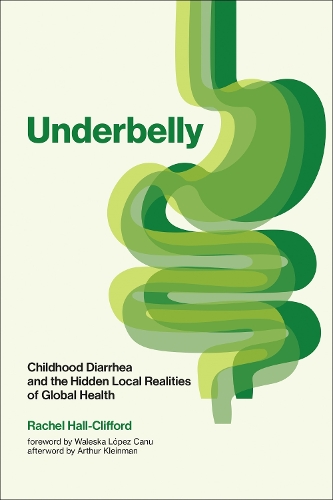
Underbelly: Childhood Diarrhea and the Hidden Local Realities of Global Health
(Paperback)
Publishing Details
Underbelly: Childhood Diarrhea and the Hidden Local Realities of Global Health
By (Author) Rachel Hall-Clifford
By (author) Arthur Kleinman
MIT Press Ltd
MIT Press
11th June 2024
United States
Classifications
General
Non Fiction
618.923427
Physical Properties
Paperback
272
Width 152mm, Height 229mm
Description
Deaths from childhood diarrhea seem preposterous in high-income countries. Yet, for children under five years old in the rest of the world, diarrhea is the third highest cause of mortality. Despite a glut of prevention and treatment programming spanning more than 40 years, this least glamorous of global health ills remains a critical problem. In Underbelly, Rachel Hall-Clifford takes a hard look at the pathways of global health funding and development policies and the outcomes they deliver for recipient individuals and communities. Drawing on fifteen years of ethnographic research in highland Guatemala, Hall-Clifford focuses on the provision of primary health care services as a critical exemplar of how global health and development programs fall short. Guatemala has a fragmented health system, the author explains, that guarantees health as a human right but also suffers from systemic racism, inadequate health services and access to those services, community distrust from a legacy of harm and violence, and a demeaning paternalism. Bringing together the discourses of global health and medical anthropology, Underbelly explores the ways in which global health-its actors, structures, and systems-perpetuates the challenges it purports to fix- this is the underbelly. Hall-Clifford argues that global health programs, conceived in offices distant to the places in which they are delivered, often have unintended consequences and contribute to pluralistic and exclusionary health systems that mirror neoliberal economies. She argues that if we are to fix this entrenched crisis of health inequity, we must use the immense resources of global health to center local communities as drivers of change. With a foreword written by Waleska L pez Canu, an Indigenous Maya medical director, this book underscores the importance of looking deeper into what seems on its surface incontrovertibly "good" to understand the more complex realities on the ground and in people's lives. An unsettling exploration of the hidden power dynamics of global health, seen through the lens of childhood diarrhea and its treatment within the Guatemalan context. Deaths from childhood diarrhea seem preposterous in high-income countries. Yet, for children under five years old in the rest of the world, diarrhea is the third highest cause of mortality. Despite a glut of prevention and treatment programming spanning more than 40 years, this least glamorous of global health ills remains a critical problem. In Underbelly, Rachel Hall-Clifford takes a hard look at the pathways of global health funding and development policies and the outcomes they deliver for recipient individuals and communities. Drawing on fifteen years of ethnographic research in highland Guatemala, Hall-Clifford focuses on the provision of primary health care services as a critical exemplar of how global health and development programs fall short. Guatemala has a fragmented health system, the author explains, that guarantees health as a human right but also suffers from systemic racism, inadequate health services and access to those services, community distrust from a legacy of harm and violence, and a demeaning paternalism. Bringing together the discourses of global health and medical anthropology, Underbelly explores the ways in which global health-its actors, structures, and systems-perpetuates the challenges it purports to fix- this is the underbelly. Hall-Clifford argues that global health programs, conceived in offices distant to the places in which they are delivered, often have unintended consequences and contribute to pluralistic and exclusionary health systems that mirror neoliberal economies. She argues that if we are to fix this entrenched crisis of health inequity, we must use the immense resources of global health to center local communities as drivers of change. With a foreword written by Waleska L pez Canu, an Indigenous Maya medical director, this book underscores the importance of looking deeper into what seems on its surface incontrovertibly "good" to understand the more complex realities on the ground and in people's lives.
Author Bio
Rachel Hall-Clifford is Assistant Professor of Human Health and Sociology at the Emory College of Arts and Sciences, Assistant Professor of Global Health at the Emory Rollins School of Public Health, and In-Country Director of the NAPA-OT Field School in Guatemala.
